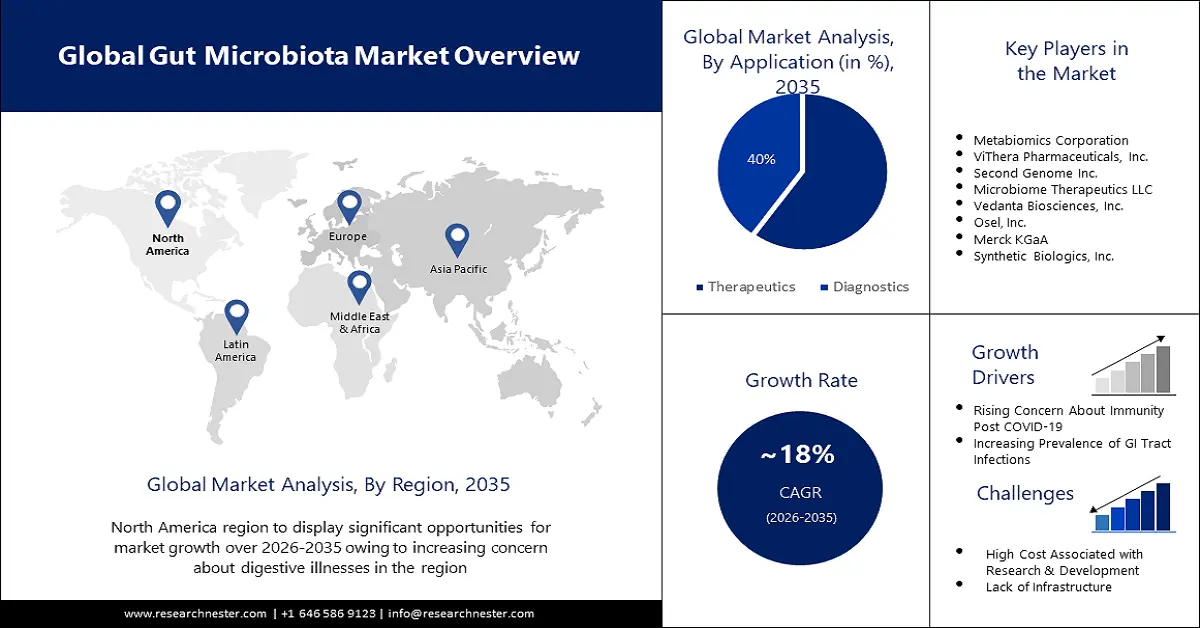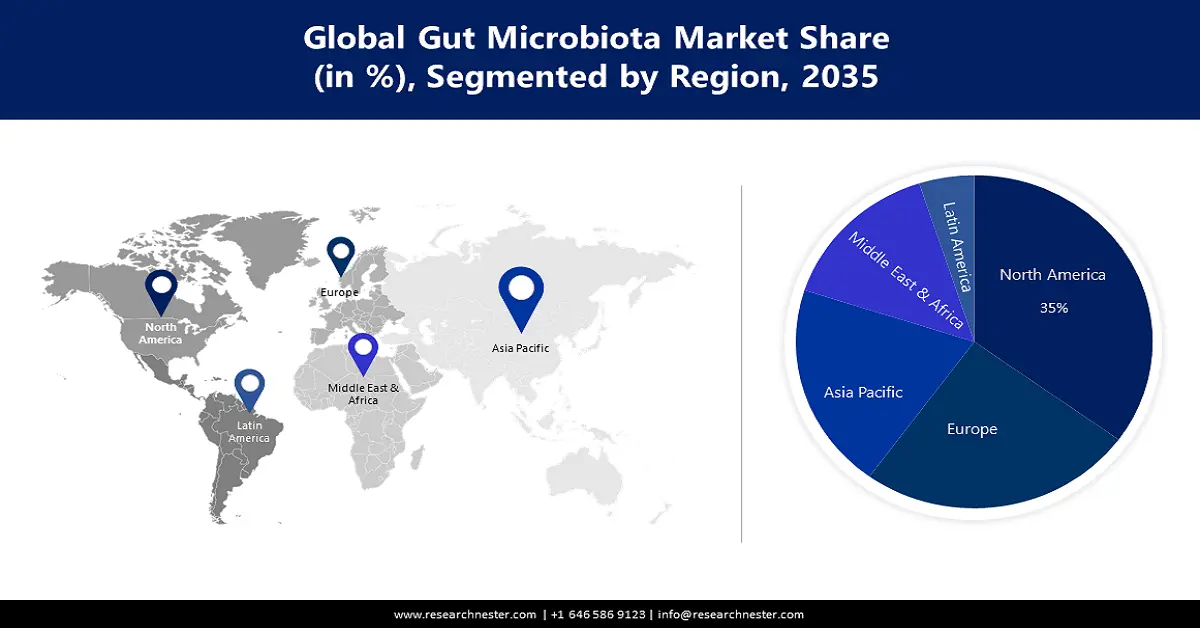Gut Microbiota Market Outlook:
Gut Microbiota Market size was valued at USD 860.4 million in 2025 and is set to exceed USD 4.66 billion by 2035, expanding at over 18.4% CAGR during the forecast period i.e., between 2026-2035. In the year 2026, the industry size of gut microbiota is evaluated at USD 1 billion.

The growth of the market can be attributed to the growing focus on the human immunity system post-COVID-19 as people with low immunity were most affected by the pandemic. According to the World Health Organization as of 23rd March 2023, there have been 761,071,826 confirmed cases of COVID-19 worldwide, which includes 6,879,677 deaths to date. Moreover, the increasing role of gut microbiota in immunity besides the rising research on how to improve gut flora is further expected to boost the market growth.
In addition to these, factors that are believed to fuel the market growth of gut microbiota include soaring investments, and collaboration between major key players to study & develop the human microbiome therapy to the next level. For instance, as per a new Bar-Ilan University study, gut microbes are anticipated to diagnose gestational diabetes as early as the first trimester of pregnancy which is months earlier than typically detected. The rising concern about gestational diabetes mellitus (GDM) worldwide which plagues around 10% of pregnant women across the globe is predicted to present the potential for market expansion over the projected period.
Key Gut Microbiota Market Insights Summary:
Regional Highlights:
- North America gut microbiota market will hold around 35% share by 2035, driven by rising concern about digestive illnesses and increasing healthcare spending.
- Europe market will secure 25% share by 2035, driven by the rising geriatric population and chronic diseases alongside microbiome therapy R&D.
Segment Insights:
- The therapeutics segment in the gut microbiota market is projected to capture a 60% share by 2035, propelled by rising investment in biopharma and increased biopharmaceutical sales post-COVID-19.
- The infectious segment in the gut microbiota market is forecasted to achieve a 45% share by 2035, driven by increasing prevalence of gastroenteritis and acute GI infections.
Key Growth Trends:
- Growing Prevalence of Gastrointestinal (GI) Tract Diseases
- Increasing Ubiquity of Type 1 & Type 2 Diabetes
Major Challenges:
- High Cost Associated with the Development of Microbiome Diagnostics Platform
- Lack of Favorable Reimbursement Scenario
Key Players: Merck KGaA, Metabiomics Corporation, ViThera Pharmaceuticals, Inc., Second Genome Inc., Microbiome Therapeutics LLC, Vedanta Biosciences, Inc., Osel, Inc., Synthetic Biologics, Inc., Synlogic, 4D Pharma plc, Metabogen AB, Symbiotix Biotherapies, Inc.
Global Gut Microbiota Market Forecast and Regional Outlook:
Market Size & Growth Projections:
- 2025 Market Size: USD 860.4 million
- 2026 Market Size: USD 1 billion
- Projected Market Size: USD 4.66 billion by 2035
- Growth Forecasts: 18.4% CAGR (2026-2035)
Key Regional Dynamics:
- Largest Region: North America (35% Share by 2035)
- Fastest Growing Region: Asia Pacific
- Dominating Countries: United States, China, Japan, Germany, United Kingdom
- Emerging Countries: China, Japan, India, South Korea, Singapore
Last updated on : 8 September, 2025
Gut Microbiota Market Growth Drivers and Challenges:
Growth Drivers
-
Growing Prevalence of Gastrointestinal (GI) Tract Diseases – gut microbiota being a vast and complex collection of microorganisms affects human health in many ways. They are essential in helping humans to absorb nutrients. Therefore, the rising prevalence of the GI tract amongst the global population owing to an increase in the consumption of unhealthy foods, and surging stress levels among middle age people worldwide are anticipated to propel the market growth. It is observed that in the United States, the estimated prevalence of irritable bowel syndrome is between 11% and 14% and this share is predicted to increase further in the upcoming years.
-
Increasing Ubiquity of Type 1 & Type 2 Diabetes - the alterations in the intestinal bacterial composition are known to be associated with the presence of chronic low-grade inflammation. This is a characteristic of insulin resistance and type 2 diabetes mellitus. The rising ubiquity of type 2 diabetes worldwide is anticipated to boost the market growth in the forecast period. As per research, over 37 million Americans are suffering from diabetes (nearly 1 in 10), and around 90-95% of them have type 2 diabetes.
-
Rising Health Spending – Recent expenditure data states that health spending worldwide has increased over the past 20 years, doubling in real terms to reach USD 8.5 trillion in 2019 and 9.8% of GDP, up from 8.5 percent in 2000. With the rising concern of low microbial diversity in the gut among children and middle age populations, the market is estimated to flourish over the forecast period.
-
Surging Prevalence of Diarrhea in Children – According to the World Health Organization report, diarrhea is listed as the second general cause of death in children under the age of 5, killing nearly 500 000 children under the age of 5 every year. Moreover, about 2 billion children worldwide suffer from diarrheal sickness every year.
As there are both, good and bad bacteria present in the gut, the entrance of harmful bacteria in the GI tract causes infection. Hence, the market is expected to grow at a substantial rate with the increasing research & spending to curb such infections that cause food poisoning and other GI diseases that result in diarrhea and vomiting among the populaces.
Challenges
- High Cost Associated with the Development of Microbiome Diagnostics Platform - the research and development proficiencies in the field of microbiome diagnosis drastically depend upon the employed platform, technologies, and infrastructural facilities. These facilities are limited and inadequate for research on the human microbiome and gut microbiota. This, as a result, is anticipated to hamper the market growth in the upcoming years. Moreover, the lack of suitable infrastructure in low- and middle-income countries as well as slow technology penetration in these countries is further restricting market growth.
- Lack of Favorable Reimbursement Scenario
- Lack of Qualified Professionals & Supporting Staff
Gut Microbiota Market Size and Forecast:
| Report Attribute | Details |
|---|---|
|
Base Year |
2025 |
|
Forecast Period |
2026-2035 |
|
CAGR |
18.4% |
|
Base Year Market Size (2025) |
USD 860.4 million |
|
Forecast Year Market Size (2035) |
USD 4.66 billion |
|
Regional Scope |
|
Gut Microbiota Market Segmentation:
Application Segment Analysis
Therapeutics segment is poised to hold more than 60% gut microbiota market share by 2035, as increasing expenditure on biomedical, biopharmaceutical as well as biotechnology industries worldwide as well as increasing sales of biopharmaceuticals post-COVID -19. For instance, out of the total drug sales in 2021, biopharmaceuticals generated around 40% of global drug sales. Furthermore, the rising number of collaborations for R&D between market key players to better understand human gut health and develop apparent drug delivery systems to enhance the balance of gut microbiota besides the growing technological advancement in the therapeutics segment is further anticipated to boost the segment growth.
Disease Segment Analysis
Infectious segment is expected to capture over 45% gut microbiota market share by 2035, backed by the increasing prevalence of unspecified gastroenteritis as well as the growing number of suffering from patient diarrheal illnesses besides rising incident cases of acute gastrointestinal (GI) infections caused by Campylobacter, nontyphoidal Salmonella, Shigella, Escherichia coli (E. coli), or norovirus. For instance, a report stated that between the years 2010-2019, in the United States, the cases of unspecified gastroenteritis/diarrhea diagnoses accounted for over 98%. Moreover, nearly 2,241 cases of Campylobacter infections were diagnosed in the same period followed by Salmonella infections, Shigella, Escherichia coli (E. coli), or norovirus.
Our in-depth analysis of the global market includes the following segments:
|
By Product |
|
|
By Application |
|
|
By Disease |
|

Vishnu Nair
Head - Global Business DevelopmentCustomize this report to your requirements — connect with our consultant for personalized insights and options.
Gut Microbiota Market Regional Analysis:
North American Market Insights
North America industry is set to hold largest revenue share of 35% by 2035, rising concern about digestive illnesses such as gastroesophageal reflux disease (GERD) as well as other lifestyle disorders owing to the growing sedentary lifestyle, remote jobs, junk foods, and others. For instance, as per a study in 2022, nearly 20% of the U.S. population was affected by GERD or chronic acid reflux. Moreover, the rising spending on health care in the region is further expected to enhance the gut microbiota market in the region.
Europe Market Insights
The European gut microbiota market is estimated to be the second largest, registering a share of about 25% by the end of 2035, rising geriatric population as well as the growing ubiquity of heart diseases and other chronic diseases coupled with the increasing research & development and clinical trials in the field of microbiome therapy in the region. It was found that over one-fifth or over 21% of the European Union population was aged 65 and over in 2022. Moreover, the increasing awareness of preventive healthcare in the region is further anticipated to propel regional market growth.
APAC Market Insights
Asia Pacific region is estimated to account for significant revenue share by the end of 2035. The presence of a vast pool population as well as the growing prevalence of autoimmune diseases such as celiac diseases, diabetes, asthma, cancer, and others in the region coupled with the increasing prevalence of obesity and other lifestyle-related diseases. For instance, a study conducted in 2019, recruiting nearly 19,778 Chinese adolescents and young adults, showed that the prevalence of celiac disease autoimmunity reached nearly 2.19% in the country. Moreover, diabetes prevalence in Chinese adults is estimated to rise from 8% to around 9.5% among the age group of 20–79 years between 2020-2030.

Gut Microbiota Market Players:
- Merck KGaA
- Company Overview
- Business Strategy
- Key Product Offerings
- Financial Performance
- Key Performance Indicators
- Risk Analysis
- Recent Development
- Regional Presence
- SWOT Analysis
- Metabiomics Corporation
- ViThera Pharmaceuticals, Inc.
- Second Genome Inc.
- Microbiome Therapeutics LLC
- Vedanta Biosciences, Inc.
- Osel, Inc.
- Synthetic Biologics, Inc.
- Synlogic
- 4D Pharma plc
- Metabogen AB
- Symbiotix Biotherapies, Inc.
Recent Developments
-
Merck KGaA a leading science and technology company and leader in genome editing, collaborated with Washington University in St. Louis, Missouri, USA, for leading towards the optimization of nutritional supplements to restore a healthy gut microbial community (microbiome). This gut bacteria research would use Merck’s genome-editing technology and may lead to diagnostics, and treatment for malnourished children.
-
Metabiomics Corp., an early-stage molecular diagnostics company entered into a joint venture with Prescient Medicine Holdings, LLC, a company that operates in the Medical Devices industry to develop an innovative microbiome diagnostics platform. This platform will detect precancerous colon polyps and diagnose other types of gastrointestinal diseases including Crohn’s, colitis (IBD), and irritable bowel syndrome (IBS).
- Report ID: 3251
- Published Date: Sep 08, 2025
- Report Format: PDF, PPT
- Explore a preview of key market trends and insights
- Review sample data tables and segment breakdowns
- Experience the quality of our visual data representations
- Evaluate our report structure and research methodology
- Get a glimpse of competitive landscape analysis
- Understand how regional forecasts are presented
- Assess the depth of company profiling and benchmarking
- Preview how actionable insights can support your strategy
Explore real data and analysis
Frequently Asked Questions (FAQ)
Gut Microbiota Market Report Scope
Free Sample includes current and historical market size, growth trends, regional charts & tables, company profiles, segment-wise forecasts, and more.
Connect with our Expert
Copyright @ 2026 Research Nester. All Rights Reserved.




